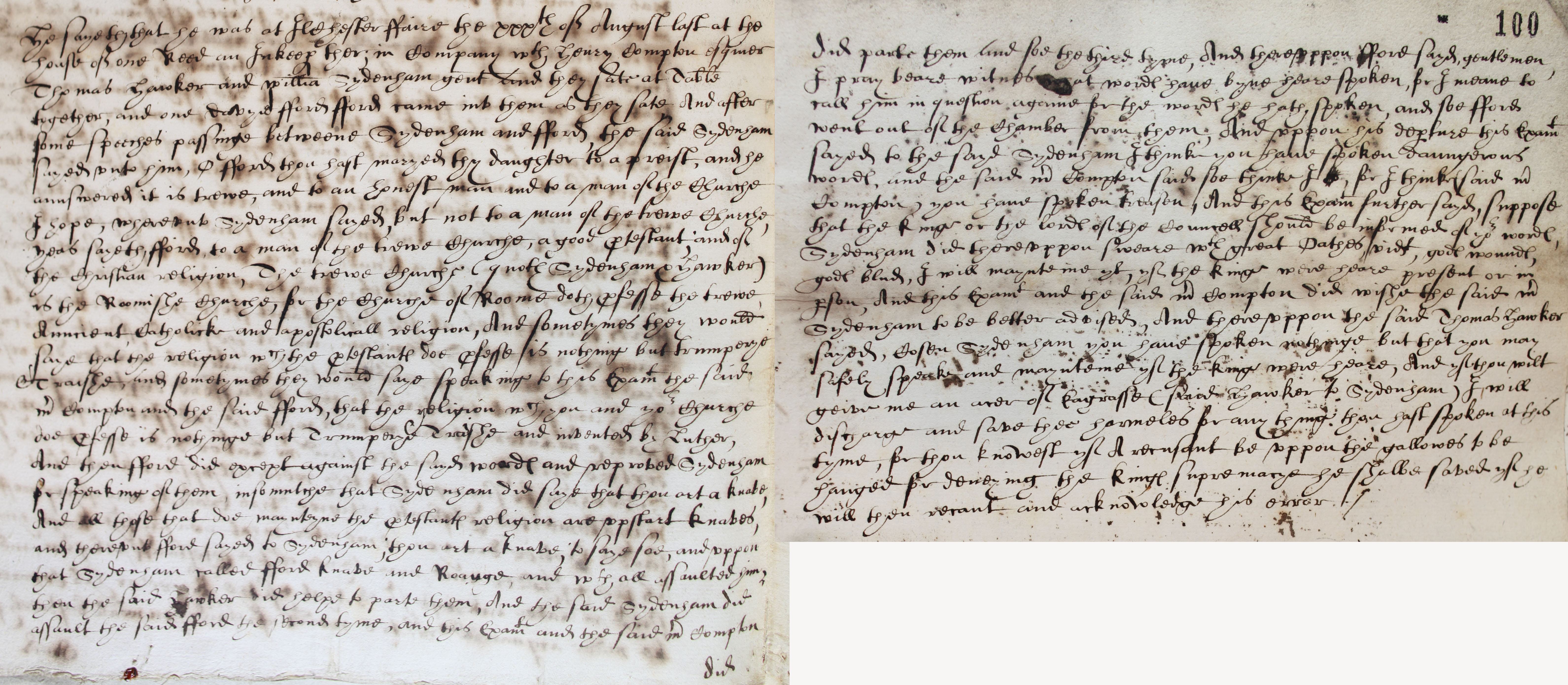Information provided by a witness, Thomas Laver, of Lambrook, to Marmaduke Jennings [Justice of the Peace]. This was part of the examination for scandalous and seditious words of Thomas Hawker and William Sydenham in the county of Somerset and sent to the Archbishop of Canterbury, 15 September 1619 (catalogue ref: SP 14/110 ff. 99v-100r)
This source concerns the case of Thomas Hawker and William Sydenham and shows local tensions between Catholics and Protestants as an argument erupted in a pub, and the ways in which these conversations could be reported to the authorities.
Transcript
He sayeth that he was at Ilchester [in Somerset] Fair the 30th of August last at the house of one Reed, an innkeeper there; in Company with Henry Compton Esquire, Thomas Hawker and William Sydenham, gentleman, and they sat at table together, and one David Ford came into them as they sat and after some speeches passing between Sydenham and Ford, the said Sydenham said unto him, Oh Ford thou hast married thy daughter to a priest, and he answered it is true, and to an honest man and to a man of the Church I hope, whereunto Sydenham said, but not to a man of the true Church, yes sayeth Ford, to a man of the true Church, a good protestant, and of the Christian religion. The true Church (quoth [said] Sydenham & Hawker) is the Romish Church, for the Church of Rome doth possess the true Ancient, Catholic and Apolostical religion. And sometimes they would say that the religion with the protestants doe possess is nothing but trumpery trash, and sometimes they would say speaking to this Examinant the said Mr Compton and the said Ford, that the religion which you and your Church do possess is nothing but trumpery trash and invented by Luther. And then Ford did except against the said words and reproved Sydenham for speaking of them, in so much that Sydenham did say that thou art a knave. And all those that do maintain the protestants religion are upstart knaves, and there unto Ford said to Sydenham, though art a knave, to say so, and upon that Sydenham called Ford knave and rogue, and with all assaulted him, then the said Hawker did help to part them. And the said Sydenham did assault to said Ford the second time, and this examinant and the said Mr Compton did parte them and so the third time, And there upon Ford said gentlemen, I pray bear witness that words have been here spoken, for I mean to call him in question again for the words he hath spoken, and so Ford went out of the Chamber from them. And upon his departure this Examinant said to the said Sydenham I think you have spoken dangerous words, and the said Mr Compton said so think I, for I think (said Mr Compton) you have spoken treason. And this Examinant further said, suppose that the King or the Lords of the Council should be informed of your words, Sydenham did there upon swear with great oaths: god’s wounds, god’s blood, I will maintain it, if the King were here present or in person. And this Examinant and the said Mr Compton did wish the said Mr Sydenham to be better advised, and thereupon the said Thomas Hawker said, cousin Sydenham you have spoken nothing but that you may safely speak and maintain if the King were here. And if thou wilt give me an acre of Eagrasse [type of grass (said Hawker to Sydenham) I will discharge and save thee harmless for anything thou hast spoken at this time, for thou knowest if a recusant be upon the gallows to be hanged for denying the King’s supremacy he shall be saved if he will then recant and acknowledge his error.
